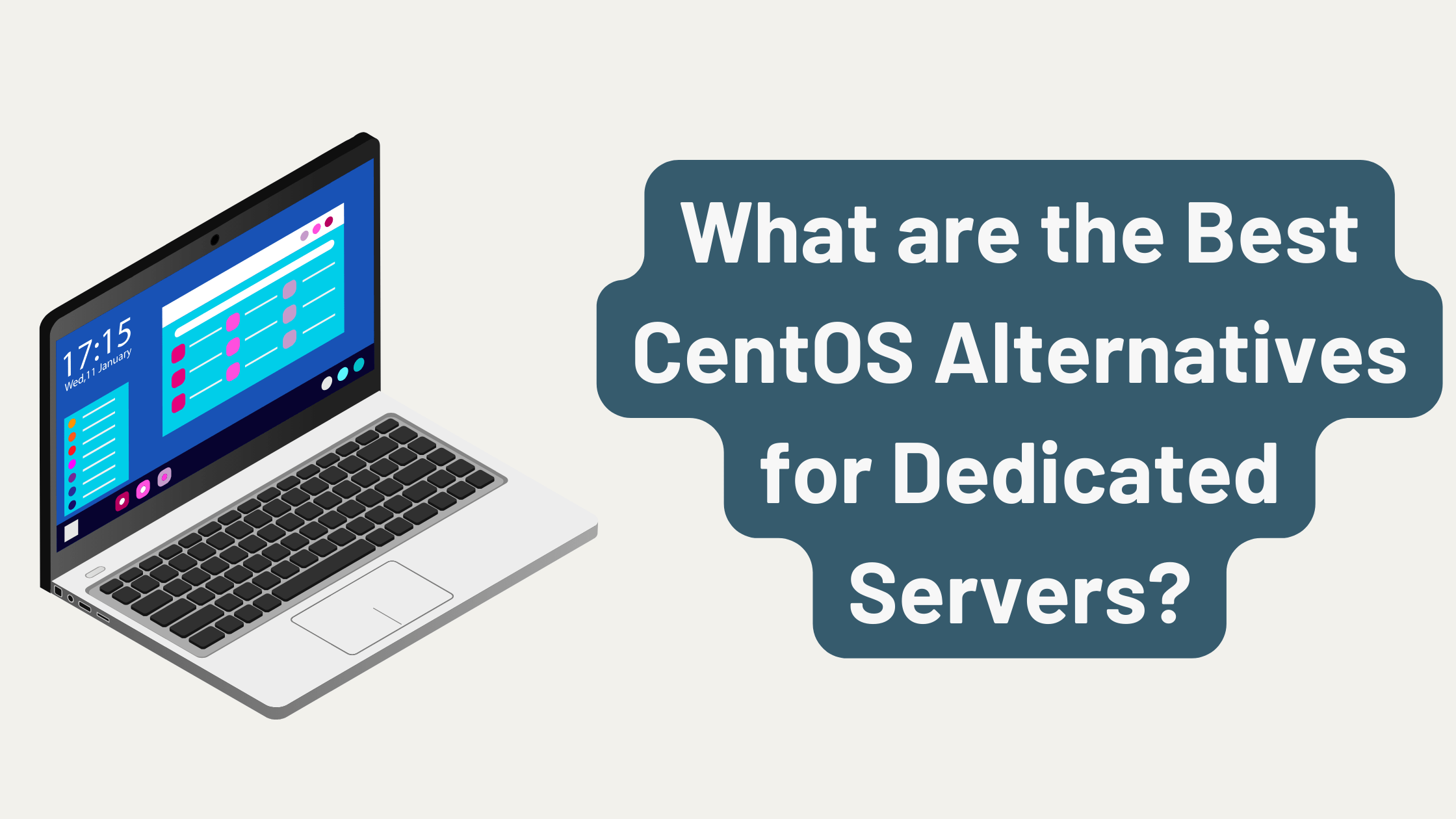
What are the Best CentOS Alternatives for Dedicated Servers?
In the realm of dedicated servers, the choice of operating system is pivotal for ensuring optimal performance, security, and reliability. With the shift in the Linux landscape, particularly after CentOS’s change in direction, many are seeking robust alternatives for their unmetered dedicated server and streaming dedicated server needs. This comprehensive guide delves into the top contenders, each offering unique advantages for dedicated server environments.
Rocky Linux
Rocky Linux stands out as a stellar CentOS alternative, particularly for those who valued CentOS’s close ties with Red Hat Enterprise Linux (RHEL). As a fork of CentOS, Rocky Linux promises a seamless transition with its RHEL compatibility, ensuring minimal disruption in migration.
- Stability and Reliability: Mirroring RHEL’s stability, Rocky Linux is an excellent choice for critical applications.
- Community-Driven: With strong community support, it rapidly addresses security patches and updates.
- Enterprise-Grade: Ideal for businesses seeking an enterprise-grade environment without the hefty price tag.
AlmaLinux
AlmaLinux emerges as another strong contender, offering a free, open-source solution that aligns closely with CentOS’s original ethos. It’s a 1:1 binary compatible fork of RHEL, ensuring a smooth transition for CentOS users.
- Robust Community Support: Backed by CloudLinux, it has a strong commitment to longevity and security.
- Seamless Migration: Easy switch from CentOS, making it a hassle-free option for existing setups.
- Regular Updates: Frequent updates mean enhanced security and performance for your dedicated server.
Ubuntu Server
Ubuntu Server is a widely acclaimed choice, known for its user-friendliness and extensive software repositories. It’s particularly suited for businesses looking to deploy modern applications.
- Extensive Software Support: Offers a vast array of packages and easy installation processes.
- Strong Security Features: Regular security updates and a built-in firewall ensure a secure server environment.
- Large Community and Support: Benefit from extensive documentation and a vibrant community for troubleshooting.
Debian
Debian is renowned for its stability and robustness, making it an excellent choice for dedicated servers that demand reliability.
- Solid Stability: Ideal for environments where long-term stability is paramount.
- Free and Open Source: A completely free OS, aligning with the ethos of open-source software.
- Vast Package Repositories: Access to a plethora of packages, suitable for various server requirements.
Fedora Server
Fedora Server offers cutting-edge features and is a great option for those who prefer the latest software and innovations.
- Innovative Features: Regularly introduces new technologies, keeping your server environment up-to-date.
- Developer-Friendly: Excellent for development environments with its latest programming languages and tools.
- Strong Community Backing: Supported by Red Hat, it has a robust community and enterprise-level support.
Oracle Linux
Oracle Linux stands out for its optimization for Oracle products, making it an ideal choice for businesses using Oracle software.
- Optimized for Oracle: Tailored for Oracle databases and applications, ensuring enhanced performance.
- Ksplice Technology: Unique for its zero-downtime kernel updates, crucial for maintaining server availability.
- Free to Use: Offers a cost-effective solution with the option for paid support.
openSUSE
openSUSE is a versatile choice, known for its scalability and flexibility, suitable for both small and large-scale server deployments.
- YAST Management Tool: Its unique YaST tool simplifies server management, making it accessible even for novices.
- Regular Updates: Ensures a secure and stable server environment with frequent updates.
- Flexible and Scalable: Adapts well to any server environment, from small businesses to large enterprises.
How to Choose an Alternative to CentOS for Your Dedicated Server
Selecting the right operating system for your dedicated server is a critical decision that can significantly impact your server’s performance, security, and manageability. With CentOS shifting its direction, many users are exploring alternatives. Here’s a guide to help you make an informed choice.
Assess Your Server Requirements
Start by evaluating your server’s primary function. Different operating systems cater to various needs:
- Web Hosting and General Use: If you’re running standard web hosting services, look for an OS with robust web server support and easy management, like Ubuntu Server or Debian.
- Enterprise and Database Applications: For enterprise-level applications or databases, consider Oracle Linux for its optimization with Oracle products.
- Development and Cutting-Edge Technology: If your server is used for development, Fedora Server, with its latest programming tools, might be the best fit.
- Stability and Long-Term Support: For servers requiring long-term stability without frequent upgrades, Debian or Ubuntu LTS (Long Term Support) versions are excellent choices.
Evaluate Community and Commercial Support
The level of support available can be a deciding factor:
- Community Support: Operating systems like Ubuntu Server and Fedora have large communities. This can be invaluable for troubleshooting and advice.
- Commercial Support: If you prefer professional support, consider options like Ubuntu Server or Oracle Linux, which offer paid support services.
Consider Compatibility and Migration Ease
If you’re migrating from CentOS, compatibility is crucial:
- Binary Compatibility with RHEL: Rocky Linux and AlmaLinux are 1:1 binary compatible with RHEL, making them ideal for a smooth transition from CentOS.
- Migration Tools and Documentation: Look for distributions that provide comprehensive migration guides and tools to facilitate a hassle-free switch.
Review Security and Update Policies
Security is paramount for any server:
- Regular Security Updates: Ensure the OS has a strong track record of regular and timely security updates.
- Built-in Security Features: Some distributions come with enhanced security features. For example, Ubuntu Server includes AppArmor, and Fedora has SELinux.
Test Performance and Stability
Before finalizing your decision:
- Trial Runs: Test the OS in a controlled environment to assess its performance and stability with your specific applications.
- Community Feedback: Look for user reviews and feedback, especially from those with similar server setups.
Check Hardware Compatibility
Ensure the OS supports your server’s hardware. Most Linux distributions have broad hardware support, but it’s always good to confirm, especially for specialized hardware.
Consider Licensing and Cost
Finally, consider the cost:
- Free vs. Paid: Some options like Ubuntu Server are free, while others like Oracle Linux offer additional paid services.
- Open Source vs. Proprietary: Decide if you prefer an entirely open-source solution or are open to proprietary components for additional features or support.
In conclusion, the landscape for dedicated server operating systems has evolved significantly, offering a variety of robust alternatives to CentOS. Each of these alternatives – Rocky Linux, AlmaLinux, Ubuntu Server, Debian, Fedora Server, Oracle Linux, and openSUSE – brings unique strengths to the table. Whether your priority is stability, cutting-edge features, or specific optimizations, there is an option tailored to your unmetered dedicated server or streaming dedicated server needs.






